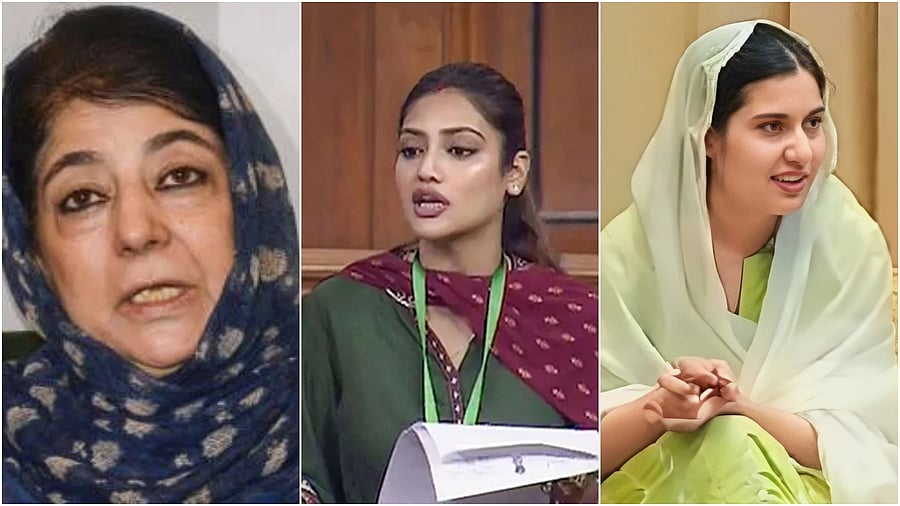
(From left) Mehbooba Mufti, Nusrat Jehan, Iqra Hasan.
Credit: PTI Photos
New Delhi: Around 7,500 people have been elected to the Lok Sabha since the first general elections in 1951-52 but only 18 were Muslim women with 30 states and union territories never sending a woman from the minority community to the Lower House in the past 74 years, a new book says.
The book ‘Missing from the House: Muslim Women in the Lok Sabha’ finds it “surprising” that none of the five southern states — including Karnataka, known for better political representation and socio-economic indicators like literacy than the North — have sent a Muslim woman to the Lok Sabha.
Authored by journalist Rasheed Kidwai and political scientist Ambar Kumar Ghosh, the book says only 0.6% or 18 Lok Sabha MPs in the past 74 years were women when India elected nearly 7,500 MPs.
Uttar Pradesh sent the highest number of six women who served nine terms from five seats. West Bengal sent four women from four seats serving five terms. Assam, Gujarat, Madhya Pradesh and Jammu and Kashmir were the only other states that sent Muslim women to the Lok Sabha.
“It is a shockingly abysmal figure, considering Muslim women are about 7.1% of India’s 146 crore population. Out of the 18 Lok Sabhas constituted till 2025, five times the Lok Sabha did not have a single Muslim woman. Equally shocking is the fact that the number of women elected to Parliament in one tenure never crossed the mark of four in the 543-seat Lower House,” it says.
There were no Muslim women in the 1st (1952-57), 4th (1967-71), 5th (1971-77), 9th (1989-91) and 10th (1991-96) Lok Sabhas.
The first Muslim women to get elected to Lok Sabha was Mofida Ahmad from Assam’s Jorhat and Maimoona Sultan, who served two consecutive terms, from Bhopal in 1957. Muslim women MPs include Mohsina Kidwai, Mehbooba Mufti and current MP Iqra Hasan.
The book, which also provides a brief sketch of these 18 MPs, also says 13 of them “came from dynastic backgrounds”.
“Dynasty has, in fact, been closely linked to women’s representation in the Indian Parliament. This made us wonder if, in the absence of dynastic culture in Indian electoral politics, the representation of women in general and Muslim women in particular might have been more negligible,” Kidwai and Ghosh write.
“...though family connections propelled many Muslim women to participate in electoral politics…them claiming their political identity has rarely been out of their own independent choice. Rather, their presence in electoral politics has been much more about filial responsibility and out of a sense of duty towards their male family members, stepping up to fill their shoes as daughters, wives, daughters-in-laws, nieces and so on,” they add.
Very few could serve as long-term MPs or become ministers reveals the difficulty that even these “politically successful” women confronted to sustain their political journeys, the book says while insisting that it is “not a reflection of their lack of political grit or appetite”.
List of 18 Muslim Women MPs
Mofida Ahmed -- 1957 -- Congress
Maimoona Sultan 1957-67 -- Congress
Zohraben Akbarbhai Chavda -- 1962-67 -- Congress
Begum Akbar Jehan Abdullah -- 1977-79, 1984-89 -- National Conference
Rashida Haque -- 1977-79 -- Congress
Mohsina Kidwai -- 1977-89 -- Congress
Abida Ahmed -- 1981-89 -- Congress
Noor Bano -- 1996, 1999-2004 -- Congress
Rubab Sayda -- 2004-09 -- Samajwadi Party
Mehbooba Mufti 2004-09, 2014-19 -- PDP
Tabassum Hasan -- 2009-14 -- SP, Lok Dal, BSP
Mausam Noor -- 2009-19 -- Trinamool Congress
Kaisar Jahan -- 2009-14 -- BSP
Mamtaz Sanghamita 2014-19 -- Trinamool Congress
Sajda Ahmed 2014-24 -- Trinamool Congress
Ranee Narah 1998-2004, 2009-14 -- Congress
Nusrat Jahan Ruhi 2019-24 -- Trinamool Congress,
Iqra Hasan -- 2024-present -- Samajwadi Party
